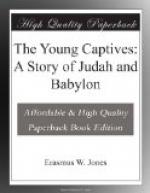The dawn of day presented to the inhabitants of Jerusalem their true and lamentable condition. A portion of the Chaldean army was already encamped on the plains before the city, and nearby the remaining legions were on a rapid march to the same spot. This sudden appearance of the forces of Nebuchadnezzar before the walls of Jerusalem was owing to the King of Judah’s refusing to pay the tribute money as agreed on another occasion.
Three years before, the same king, who then reigned jointly with his father, brought his forces before the city, and without any resistance they thought fit to surrender. Jehoiakim was still permitted to reign, but subjected to be a tributary to the King of Babylon. For two years this agreement was adhered to by the King of Judah. On the third, the King of Babylon marched his forces into Egypt, to bring into subjection the revolting inhabitants, whom he had previously conquered. Jehoiakim, trusting that the Egyptians would be able to stand their ground, and, peradventure, prove victorious, thought this a favorable time to throw off the Chaldean yoke; and consequently, scornfully refused to pay the tribute money, and treated the Chaldean ambassador with haughtiness. But, contrary to the expectations of the King of Judah, the Egyptians, when they beheld the powerful legions of the Chaldeans, gave up their rebellion, and promised allegiance to the King of Babylon. Nebuchadnezzar, enraged by the conduct of the King of Judah, ordered his forces in Egypt to march and encamp before the walls of Jerusalem.
Early in the morning of that fatal day, Jehoiakim called together a grand council, in order to deliberate on the best measures to be pursued in the painful emergency. Some advised a strenuous resistance; others said this would be vain—that the city was not able to stand a siege for one month because they were destitute of provisions, and, moreover, the army was in a very imperfect condition. The king thought it advisable to show no resistance, but to treat the King of Babylon with, civility. Finally, the grand council agreed that it was not expedient to resist the entrance of the King of Babylon, and concluded to throw open the gates of the city.
As yet the Chaldeans remained stationary, about thirty furlongs to the south. About the third hour they began to advance, their glittering arms, dazzling in the bright sunbeams, giving them a grand and imposing appearance. The walls of the city were thronged with anxious gazers, and all hearts throbbed with deep and painful anxiety. Nearer and nearer they approached! The rumbling of their war chariots fell heavily on the ear. The heavy hoofs of their spirited chargers made the earth tremble. The loud blasts of their numerous trumpeters were carried on the wings of the wind, while the echoes answered from the lofty towers of ancient Salem. Suddenly the massive gates were thrown open. Then a grand shout from the whole army rent the air. For hours they poured in through the wide portals, and once more the gods of the Gentiles were escorted in triumph through the wide thoroughfares of the “City of the Great King.”




